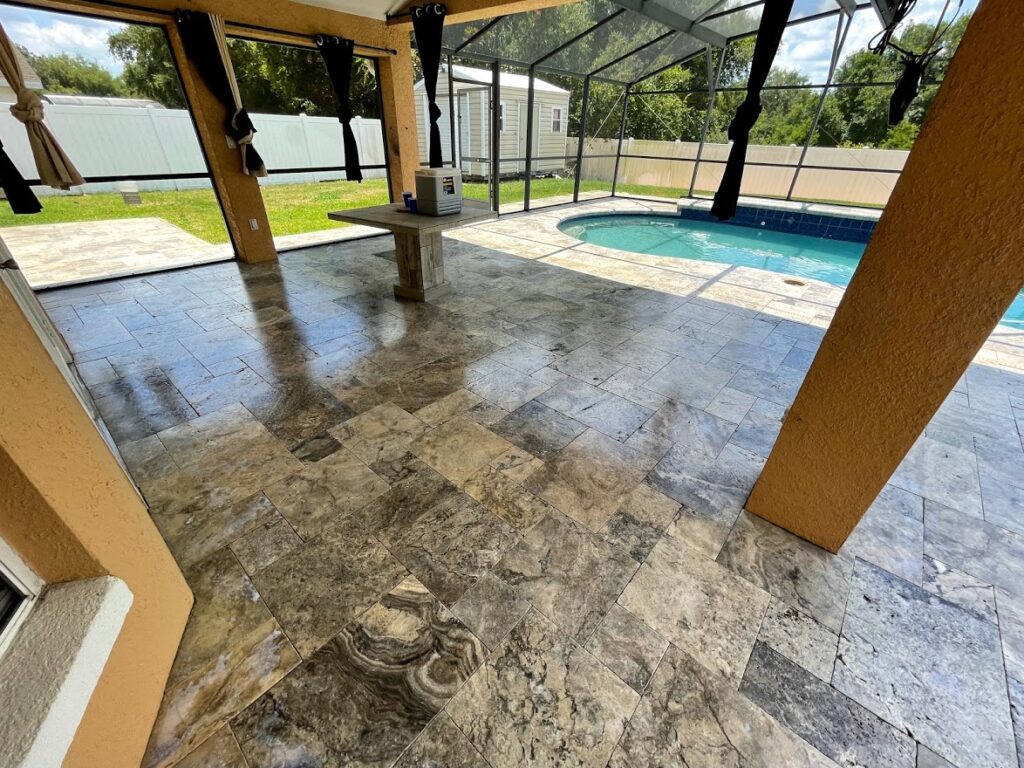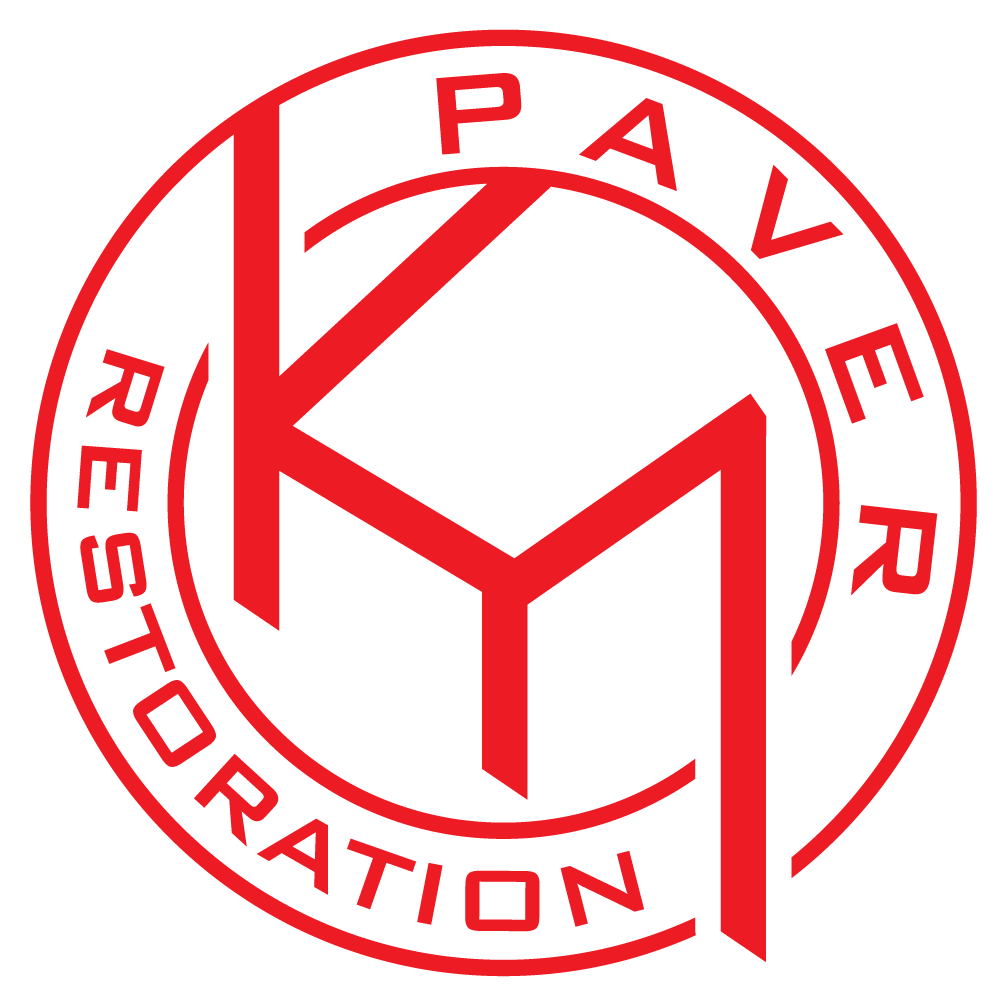Travertine Sealing
What is Travertine?
Travertine is a form of limestone deposited by mineral springs and boiling springs. Travertine often has a fibrous or concentric appearance and exists in white, tan, cream-colored, and rusty varieties. It is formed by the process of rapid precipitation of calcium carbonate, often at the mouth of a hot spring or in a limestone cave. In the latter, it can form stalactites, stalagmites, and other speleothems. It is frequently used in Italy and elsewhere as a building material.

Travertine is a terrestrial sedimentary rock formed by the precipitation of carbonate minerals from solution in ground and surface waters and geothermal heated hot springs. Similar (but softer and extremely porous) deposits formed from ambient-temperature water are known as tufa.
When manufactured as tiles or slabs, Travertine is generally filled with cement and polished or honed with open pores and cravats left behind.
Why Seal Travertine?
Travertine is riddled with interconnected capillary channels that permit penetration by liquids. These porous channels act like a sponge, and capillary action draws in fluids over time, along with any dissolved salts and other solutes. Very porous stone, such as Travertine, absorbs liquids relatively quickly. Properly sealing your travertine and shell lock paver tiles offers three primary benefits. First, it will prevent the penetration of liquids, including oils, spilled drinks, and chemicals. Second, it deters mold buildup and staining from irrigation rust, patio furniture rust, and stains from other debris. Lastly, it will stabilize joint sand to prevent tiles from becoming loose, unsafe, and wobbly while creating an impenetrable barrier for weed and mold growth between the joints. Additionally, our sealers increase the tensile strength by up to 30%, retarding cracking or chipping, and enhance this wonderful stone’s natural beauty.
Since Travertine is porous limestone, it is susceptible to staining and marking. Oil, grease, and rust are nearly impossible to remove because they are so easily absorbed. Unsealed Travertine retains water for long periods, creating an ideal situation for mold and mildew to grow. Listed below are the benefits of sealing your Travertine:
- Protects against the intense Florida sun and other natural elements
- Protects travertine tiles from oil, rust, and other stains
- Inhibits weed growth, insect intrusion, and mildew
- Enhances the look of the Travertine, adding both curb appeal and value to your home
- Provides structural integrity by locking the jointing sand in place.
- 3-year limited warranty
Our Travertine Sealing Process
You will notice right away the level of attention to detail our crews bring out to every job and the competitive pricing. We are one of the only companies in Central Florida that applies liberal coats of Ure-Seal travertine sealer on every job without watering it down! See our process below:
- Thorough power washing
- Specially blended, cleaned sand
- Liberal coats of Ure-Seal travertine sealer
- Natural or wet look with the enhancement
- Slip-Resistant Additive is a micronized polymer on the last coat
- 3-year limited warranty with years of life beyond durability
- ALL IN 1 DAY PROCESS!
Why Choose Us Over a Competitor or Doing it Yourself?
The open pores and cravats that form naturally in Travertine can quickly fill with water or contaminants if not properly sealed by a company with a lot of experience sealing Travertine. Once the coating dries with those pits filled with a sealer, you will be left with a surface that looks like someone filled all those little pits with Elmer’s glue. Even worse, this will often void the warranty from your supplier and leave you with a costly expense to strip that sealer, which is extremely difficult to do on Travertine without damaging the delicate substrate.
Since Travertine is not as common as brick pavers, most local paver sealing companies don’t have much experience sealing this complicated surface. Over the years, we have sealed many travertine pavers in commercial and residential applications. In that time, as you can imagine, we have mastered the technique behind correctly applying travertine sealant in numerous forms. We also highly discourage homeowners’ attempts to seal travertine surfaces to avoid potential damage and injury.
Can Travertine Become Slippery Once Sealed?
The simple answer is. A common question asked by those interested in travertine pavers is, “how slippery is travertine tile?” This question is open to interpretation and opinion and can affect several factors.
Some general rules can be applied to how slippery different travertine finishes are in relation to one another. Considering the “static coefficient of friction” (SCOF), which in layman’s terms is a description of the force required to move a stationary object in relation to the condition of the surface on which that object stands, will help inform you of the slipperiness of a travertine tile.
Since the factors that impact SCOF ratings include force, footwear, and surface condition, it’s essential to consider each of these when deciding who to hire and make sure they apply grip. In addition, we Highly recommend using a penetrating sealer on new or unsealed Travertine. This doesn’t change the look or add any enhancement shine or sheen, but it does an extreme benefit for protecting the Travertine and is slip free.
Judging a Surface for Slip Potential
For architects, contractors, builders, and anyone else who may need to specify a certain level of friction of building materials for legal reasons, several scientific tests determine a SCOF value. A minimum value of .50 is generally considered the minimum safety requirement for slip resistance. It is the recognized minimum standard for slip-resistant tiles in courts of law in the United States.
Different Travertine tile finishes will have different coefficients of friction, making them more or less slippery:
- Polished Travertine tiles have the most slippery finish, providing the lowest SCOF value, generally in the .40 to .50 range.
- Honed Travertine tiles are less slippery, offering the next highest SCOF rating in a range of .40 to .60, although a finely honed finish will approach the SCOF of polished travertine tiles.
- Textured finishes like tumbled and brushed are the least slippery, with a SCOF rating in the .50 to .70 range.
While these are general rules, they should only be treated as guidelines. SCOF measurement is not an exact science – the same test methods on the same tiles often do not produce the same actual numbers. Also, different testing methods on the same tiles can often have different coefficient of friction numbers. Despite all of this, progress is being made in refining and inventing better ways of measuring the coefficient of friction for other floor tiles.
Slippery when wet
The SCOF tests have been traditionally done on dry surfaces because it was assumed that all flooring surfaces, when wet, would be significantly below the minimum suggested SCOF of .50. But, one of the environmental factors that can influence SCOF is wetness, the most common source of this being water. Travertine tiles are slippery when wet, just as most glazed ceramic tiles, porcelain tiles, marble tiles, and granite tiles are.
Just as a source of wetness can decrease a SCOF rating, some sealers can increase the SCOF rating of tile flooring. In addition, many “non-slip” coatings can be applied to natural stone tiles to improve their SCOF rating. A “Non-slip” coating or sealer can raise the SCOF by .10 to .30, depending on the product.
Our Slip-Resistant Additive is a micronized polymer has a finished texture comparable to very fine-grit sandpaper. Allow your bare feet to grip without slipping and without scuffing the bottoms of your feet up!
Our Estimate Process
Nearly 90% of our estimates can be given based on a satellite imagery program, which allows us to take near-exact square footage measurements of your driveways or pool decks and patios. This lowers our overhead expenses as we can give quotes with this program, which saves time and money for you altogether. In addition, most quotes will be emailed to our customers the same day of the request with a detailed description of our process and links to all of the products we would be using.
